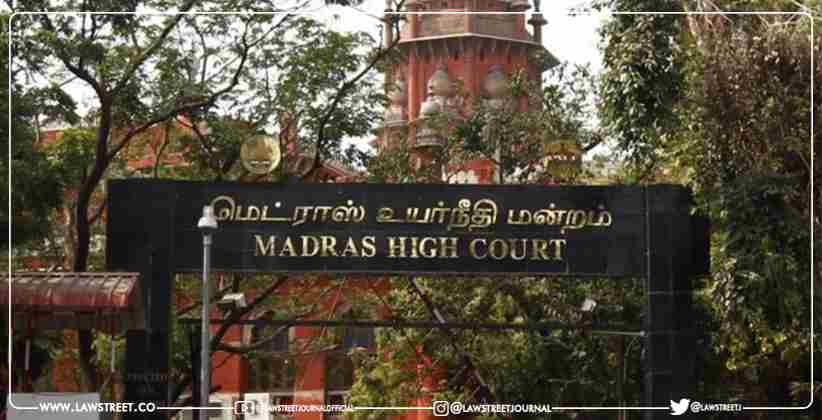The Madras High Court bench of Justice C. Saravanan refused to grant a refund of the amount lying in the assessee's electronic cash ledger on the grounds that there were serious allegations against the assessee for having an availed fraudulent input tax credit (ITC) in the electronic credit ledger on the strength of a bogus and fictitious input tax invoice for discharging GST liability with no supply.
The writ petitioner/assessee has sought the direction to refund Rs.88,17,754 lying in the petitioner's electronic ledger under Chapter IX of the CGST Rules, 2017. The electronic ledger of the petitioner has been frozen, and the petitioner was unable to use the amount.
The issue raised was whether the petitioner could seek a mandamus for a refund of amounts lying in the petitioner's electronic cash ledger.
The respondent had issued a summons to the petitioner's proprietor, Sheik Dawood. The proprietor was arrested and remanded in judicial custody. Statements were obtained from the proprietor of the petitioner and, during interrogation, a letter was extracted from the petitioner's proprietor in which the petitioner requested one of the customers, namely, Nobal Tech Industries Pvt. Ltd., to remit amounts due to the petitioner as outstanding to be directly paid into the petitioner's GSTN Account.
Counsel for the petitioner contended that the letter was obtained under coercion and that the amounts that were lying in the electronic ledger of the petitioner had hampered the day-to-day business of the petitioner inasmuch as it had resulted in a liquidity crunch and the petitioner was unable to pay either to the suppliers or pay salary to the employees.
Counsel for the petitioner submitted that by forcing the customer to directly remit the amount into the petitioner's GSTN account without the issue of a Show Cause Notice was without authority of law, and the department has practically crippled the business of the petitioner apart from placing the proprietor of the petitioner under judicial custody for a period of two months, contrary to safeguards prescribed under the CGST Act.
Counsel for the petitioner contended that when the law requires a particular thing to be done in a particular manner, then it has to be done in that manner. Section 79 of the CGST Act is similar to a recovery mechanism prescribed under Section 11 of the Central Excise Act, 1944, Section 87 of the Finance Act, 1994, and Chapter V of the Finance Act, 1994. The proper method under the CGST Act for the Department is to first thoroughly investigate and then issue a proper show cause notice under Sections 73 and 74 of the CGST Act, 2017 and adjudicate in the manner prescribed under the CGST Act. The recovery of tax can only be done in the manner prescribed by law, and thus the recovery of the amount as tax would be in violation of Article 265 of the Indian Constitution.
On the other hand, counsel for the department submitted that the department unearthed fraud of approximately Rs. 11.80 crores committed by the petitioner on the strength of fictitious invoices to discharge the tax liability and the amount which is lying in the GSTN account for a sum of Rs. 88,17,754 was a mere 7% of the estimated tax liability, which is pegged at Rs. 11.80 crores.
The court relied on the decision of the Supreme Court in the case of State of Uttar Pradesh Vs. Singhara Singh and Others, in which it was held that when the law mandates a particular thing to be done in a particular manner, then it has to be done in the aforesaid manner. Therefore, the amount that has been deposited into the Electronic Liability Register of the petitioner by the petitioner's customer or client cannot be ordered to be refunded directly. The deposit into the electronic cash ledger of the petitioner can be made not only by the petitioner, but also by any other person on behalf of the petitioner. This is evident from a reading of Section 49 of the CGST Act, 2017 read with Rule 86 of the CGST Rules, 2017.
"If the payment was coerced to be paid into the Electronic Liability Register of the petitioner by obtaining a letter from the petitioner, it may be an ingenious way of creating a liquidity crunch to ensure such an amount is not frittered away. As mentioned above, whether the payment was made under compulsion or otherwise, cannot be decided in this summary proceeding. It is for the petitioner to work out the remedy under law for refund of the amount under Section 54 of the CGST Act, 2017 read with provisions of Chapter X of the CGST Rules, 2017," the court noted.
The court observed that the amount lying in the Electronic Liability Register can be utilised by the petitioner for discharging tax liability against future supplies to be made by the petitioner, provided, of course, prior to such supply, the tax to be paid by the petitioner is adjudicated and determined and appropriated in the proposed proceedings under Section 73 or 74 of the CGST Act, 2017, in which case, Section 79 of the CGST Act, 2017 can be pressed into service.
"As the amount has not been debited and since it has not been appropriated so far, there is no scope for granting any relief to the petitioner in this writ petition. I therefore do not find any merit in the present Writ Petition. Therefore, the present Writ Petition is liable to be dismissed. I, however, give liberty to the petitioner to work out an appropriate remedy under Section 54 of the CGST Act read with Chapter X of the CGST Rules," the court said.
The court has directed the respondent to issue a proper show-cause notice to the petitioner, preferably within a period of three months.








